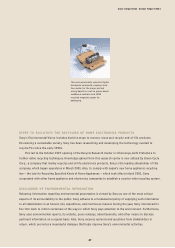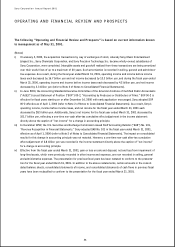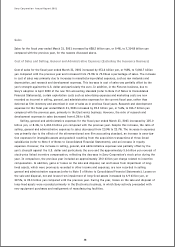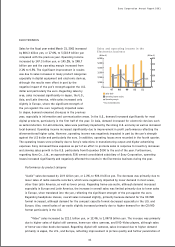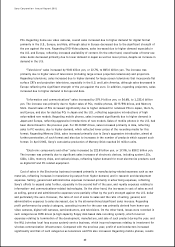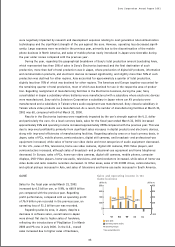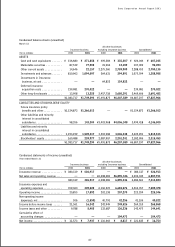Sony 2001 Annual Report Download - page 59
Download and view the complete annual report
Please find page 59 of the 2001 Sony annual report below. You can navigate through the pages in the report by either clicking on the pages listed below, or by using the keyword search tool below to find specific information within the annual report.
Sony Corporation Annual Report 2001
57
RESULTS OF OPERATIONS
(The fiscal year ended March 31, 2001 compared with the fiscal year ended March 31, 2000)
Impact of Foreign Exchange Fluctuations and Basic Countermeasures
During the fiscal year ended March 31, 2001, the average value of the yen was 109.6 yen against the U.S. dollar,
and 98.9 yen against the euro, which was 0.9% higher against the U.S. dollar and 15.1% higher against the euro,
respectively, compared with the level of the previous year. Operating results on a local currency basis described in
“Operating Performance” show results of sales and operating revenue (“sales”) and operating income obtained by
applying the yen’s monthly average exchange rate in the previous year to monthly local currency-denominated
sales, cost of sales, and selling, general and administrative expenses for the fiscal year ended March 31, 2001,
assuming the value of the yen had remained the same. Regarding the U.S. based Music and Pictures businesses,
results of worldwide subsidiaries (in the case of Music, excluding those of Japan) are consolidated on a U.S. dollar
basis and then translated into yen. Therefore, regarding such businesses, discussion of operating results on a local
currency basis is on a U.S. dollar basis. Local currency basis results are not reflected in Sony’s financial statements
and are not measures conforming with Generally Accepted Accounting Principles in the U.S. (“U.S. GAAP”). Also,
Sony does not believe that these measures are a substitute for U.S. GAAP measures. However, Sony believes that
local currency basis results provide additional useful information to investors regarding operating performance.
Particularly in the Electronics and Game businesses, which are subject to foreign currency fluctuations, Sony
employs foreign exchange forward contracts and foreign currency option contracts to hedge the foreign currency
risks associated with receivables from consolidated companies that arise from its export and import transactions of
materials, parts, and products. Furthermore, particularly in the Electronics business, to minimize the adverse effects
of foreign exchange fluctuations on its financial results and to reduce inventory and costs, Sony seeks, when
appropriate, to localize material and parts procurement, design, and manufacturing operations outside Japan.
Operating Performance
For the fiscal year ended March 31, 2001, worldwide economic conditions were generally favorable during the
first half of the year in such major regions as Japan, the U.S., Europe, Asia excluding Japan (“Asia”), and Latin
America, reflecting continued strong economic growth in the U.S. and Europe. However in the second half of the
year, an economic slowdown was clearly seen in the U.S., where there was a rapid deceleration in the growth of
personal consumption. Corresponding to this negative trend in the U.S., economies of such regions as Asia and
Europe as well as Japan also showed signs of slowing down toward the end of the year. In Japan, full-scale
economic recovery was not achieved partly due to continuing concerns regarding the quality of credit portfolios
in the banking sector. Under such market conditions and reflecting the impact of the translation of financial
results into yen, the currency in which the financial statements are prepared, Sony’s sales for the fiscal year
ended March 31, 2001 increased 9.4% and operating income increased 1.0% compared with the previous year.
The favorable results for sales and operating income were primarily due to strong results in the Electronics business
despite the negative impact of the yen’s strength against the U.S. dollar and particularly the euro. The sales
increase was due to higher sales in all business segments except for the Music business. The slight increase in
operating income was due to significant profit increase in the Electronics business offset by losses in the Game
and Other businesses and lower profits in the Music, Pictures, and Insurance businesses.
On a local currency basis (In connection with all references herein to results of operations expressed on a
local currency basis, please refer to “Impact of Foreign Exchange Fluctuations and Basic Countermeasures.”),
Sony’s sales for the fiscal year ended March 31, 2001 increased approximately 12% and operating income
increased approximately 48% compared with the previous year.


